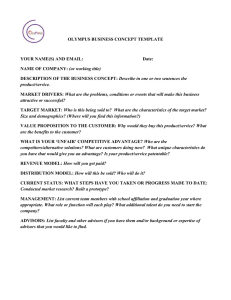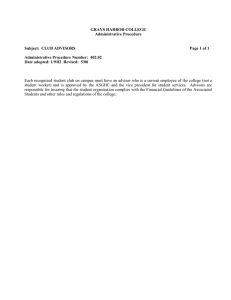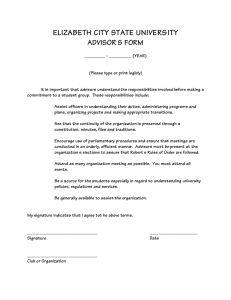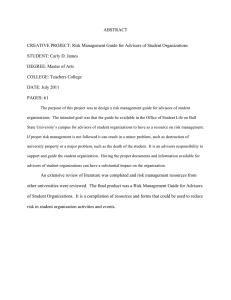Below is a sample agenda that can be used for... In addition to articulating expectations and describing the educational objectives...
advertisement
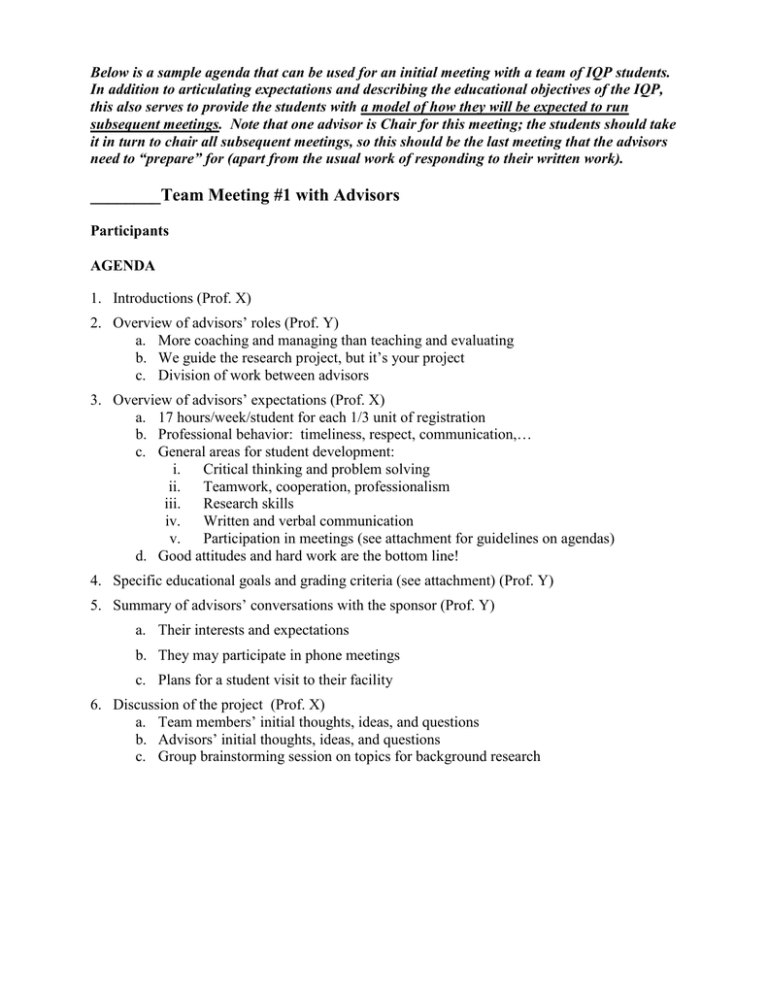
Below is a sample agenda that can be used for an initial meeting with a team of IQP students. In addition to articulating expectations and describing the educational objectives of the IQP, this also serves to provide the students with a model of how they will be expected to run subsequent meetings. Note that one advisor is Chair for this meeting; the students should take it in turn to chair all subsequent meetings, so this should be the last meeting that the advisors need to “prepare” for (apart from the usual work of responding to their written work). ________Team Meeting #1 with Advisors Participants AGENDA 1. Introductions (Prof. X) 2. Overview of advisors’ roles (Prof. Y) a. More coaching and managing than teaching and evaluating b. We guide the research project, but it’s your project c. Division of work between advisors 3. Overview of advisors’ expectations (Prof. X) a. 17 hours/week/student for each 1/3 unit of registration b. Professional behavior: timeliness, respect, communication,… c. General areas for student development: i. Critical thinking and problem solving ii. Teamwork, cooperation, professionalism iii. Research skills iv. Written and verbal communication v. Participation in meetings (see attachment for guidelines on agendas) d. Good attitudes and hard work are the bottom line! 4. Specific educational goals and grading criteria (see attachment) (Prof. Y) 5. Summary of advisors’ conversations with the sponsor (Prof. Y) a. Their interests and expectations b. They may participate in phone meetings c. Plans for a student visit to their facility 6. Discussion of the project (Prof. X) a. Team members’ initial thoughts, ideas, and questions b. Advisors’ initial thoughts, ideas, and questions c. Group brainstorming session on topics for background research Guidelines on Agendas for Weekly Meetings The project team has the responsibility to run weekly meetings. The progress report /agenda for each meeting should always include the following items: Accomplishments in the previous week. Instead of just providing a laundry list of topics or tasks, really try to make your report informational, so that it has some take-away value. What specifically did you learn? What major issues emerged? What key resources did you find? Where appropriate, include attachments as part of an agenda “packet” in order to provide more information. Do not list “trivial” accomplishments such as sending an e-mail, making a telephone call, etc., nor should you list obvious, routine things such as going to meetings. Focus on substantive accomplishments of interest to the attendees, and especially on the outcome of your efforts. Plans for the next week. Again, focus on substantive plans and what you intend to accomplish by the next meeting. Be specific, and include who will be doing what. Another way to gauge the appropriateness of these agenda items is to ask yourselves if the content reflects the level of expected effort for a one week period, which for a 4-person team doing 1/3 unit of work is about 70 person-hours! Are the outcomes of those hours’ worth of work evident? Remember that each team member should participate in every meeting, with responsibility for some subset of the agenda items. The chair’s role is to keep the meeting on track, not to report everything himself or herself. Evaluation of IQPs It is important that we communicate how we evaluate projects and assign grades. Project grading is difficult, particularly since students and advisors develop a working relationship during the project. Project grading is also very different from course grading. In a class, correctly completing all assignments and evaluations typically earns a student an A grade. However, an A project requires that students go beyond this level and demonstrate originality, initiative, and critical thinking. Students generally feel that lots of hard work and a nicely presented report deserves an A. Most professors (including us) do not, unless there is real analysis, creativity, and depth in the total project effort. The following list describes overall project expectations. IQP students are expected to: Communicate a good understanding of the problems and issues underlying the project Develop clearly stated, achievable goals for the project Strive to achieve as much balance possible between the technical and social/humanistic aspects of the project topic Develop knowledge of the relevant literature and other background sources; evaluate and synthesize this material critically and apply it appropriately to the project work Design and apply appropriate methodologies to achieve the goal, understanding their limitations Analyze the data or information collected in an appropriate fashion Develop conclusions and recommendations that are based on valid interpretation of the findings Effectively document and report information about the project, in written and oral form. Your written progress reports and drafts are the primary means by which you convey your work to your advisors; we expect that these materials will represent your best efforts In the end, achieve the goals of the project! Note that all of the above expectations focus on the “product” or “content” of the project—what you do. Equally important is the “process” of the project—how you do it. Put in steady, consistent effort Take initiative and be self-directed as much as possible. Students should make the project their own. Advisors provide suggestions and feedback; they should not have to dictate. Work on improving your team’s effectiveness. This doesn’t just happen; it takes effort. Fulfill responsibilities, meet deadlines, and conduct work in a timely fashion. Run meetings effectively. It is your responsibility to make sure they are productive. Have a good attitude: be flexible, and take adversity in stride. Remember that this is a rich opportunity for educational and personal development. When you get frustrated or make a mistake, learn from it. Have some fun doing the project! It is important to note that project grades reflect both product (i.e., the content of the final report) and the process by which it was achieved. No amount of last-minute scrambling can turn a mediocre project effort into an A. Described below are some specific guidelines on how we determine project grades. Many of them are necessarily subjective and open to some degree of interpretation, so open communication is important—please ask if you feel you’re not getting sufficient feedback about your progress. A: This grade represents a consistently excellent effort that attains, and perhaps exceeds, project goals. Characteristics of A work include meeting all requirements of the B grade, then exceeding them in several areas such as development of particularly effective or creative goals and/or methodologies, initiative, originality, depth and critical thought in analysis. Students take the lead in discussions and analysis rather than simply responding to faculty questions (particularly as the project matures), and the team functions well (which means open discussion of dissent and group dynamics). B: This grade represents a consistently good effort that attains project goals. Characteristics of B work include following up on suggestions from advisors, setting clear project goals, writing a clear, professionally presented report that has not required many drafts, completing all work in a timely and satisfactory manner, demonstrating sound analysis that includes logical interpretation of results, coming to meetings well prepared, and working hard, consistently, and diligently. A B grade means the group worked well and did a good, strong job, but probably did not show lots of originality or depth in analyzing results independently. C: This grade represents an acceptable effort that partially obtains project goals. Characteristics of C work include meeting some but not all of the requirements for a B grade; writing a readable but average report that requires many drafts and lots of faculty input; and demonstrating little or no originality and initiative. Missing deadlines, missing meetings without prior notification, and ignoring faculty comments on report drafts are traits common to some C projects. A C project cannot be made into a B project by lots of last minute work. NR: This grade denotes effort insufficient for registered credit. Characteristics of NR work include doing very little throughout the project, missing several meetings without prior notification, coming unprepared to meetings, repeatedly missing deadlines, turning in substandard work, not completing assigned tasks and showing little or no initiative. NAC: This grade is reserved for performance that is unacceptable for credit. It means that a student’s performance (or lack of it) has seriously impeded group progress, or it has embarrassed the advisor, the project sponsor, or WPI. Note that this grade remains on the transcript. One final note: You will receive an individual grade each term and overall, but you will be evaluated on how well you have worked within the context of the team, not as an individual achiever. The basis of good teamwork is a shared desire for the team to excel—not just individuals. Each team member should be assuming the primary responsibility for certain aspects of the project. At the same time, however, each team member should be familiar with all aspects of the project and be able to discuss the project in an in-depth, articulate manner.
